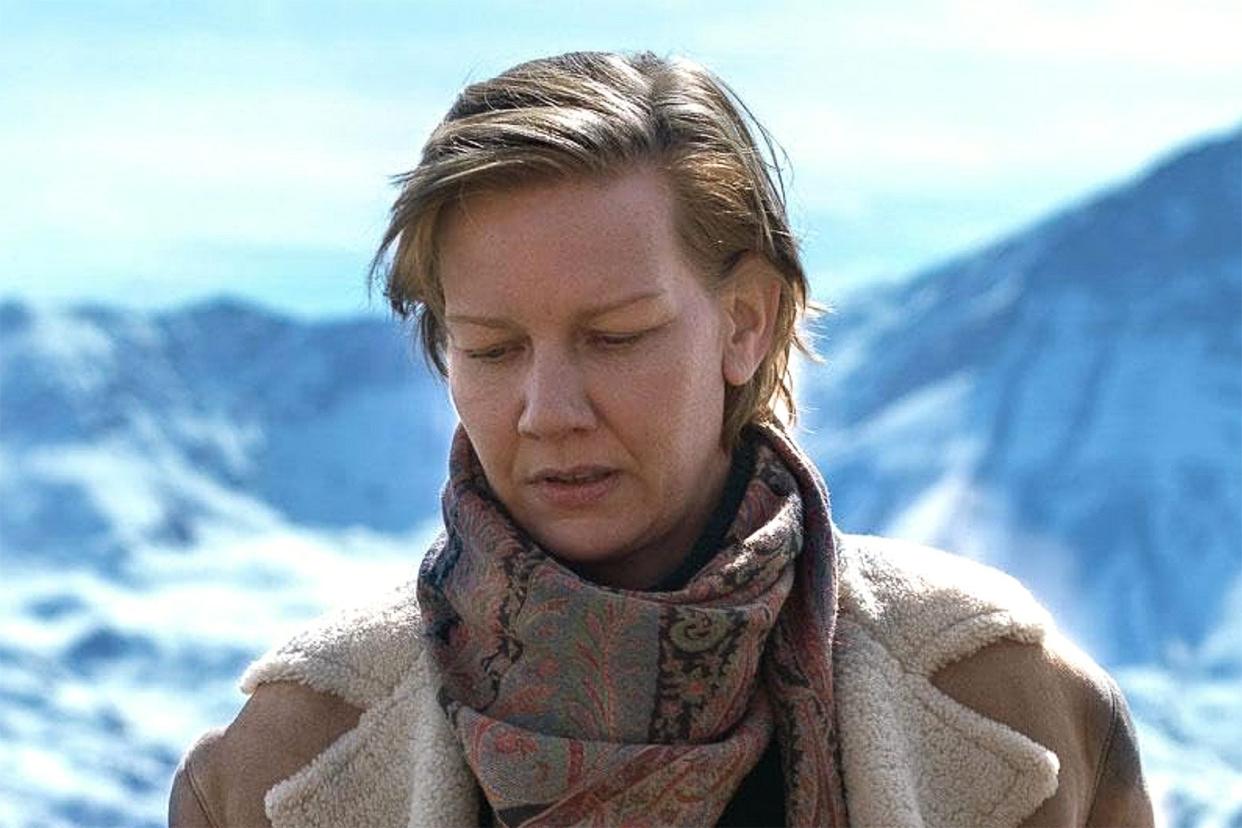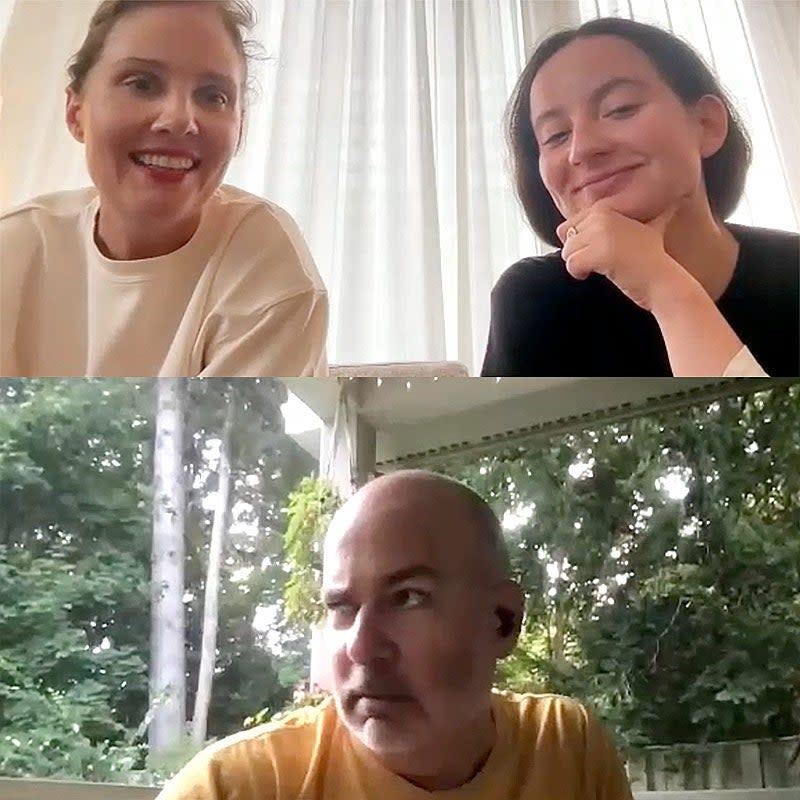It Won the Palme d’Or. It’s Expected to Rack Up Oscar Nominations. It’ll Leave Everyone Arguing.

- Oops!Something went wrong.Please try again later.
- Oops!Something went wrong.Please try again later.
- Oops!Something went wrong.Please try again later.
In French filmmaker Justine Triet’s Palme d’Or–winning Anatomy of a Fall, Sandra Hüller plays a novelist prosecuted for the mysterious death of her writer husband. The nerve-jangling trial reveals fractures in Sandra and Samuel’s marriage, but the movie refuses to resolve the “truth” about Samuel’s death—in part because the movie itself is a treatise on the unknowability of other people’s lives, relationships, and creative souls. I spoke to Triet about how she steered Hüller away from “the mystery game,” about the steel-drum cover of 50 Cent that plays during Samuel’s death, and about whether you really can steal someone else’s idea for a story. Fittingly, as Sandra is stuck in a courtroom where business must be conducted in a language she doesn’t prefer, Triet had to conduct this interview with a journalist who barely knows any French. Luckily, we had the help of a very game translator. Our conversation has been condensed and edited.
Dan Kois: Hello!
Justine Triet: Hi.
Thanks for chatting with me.
Triet: [To translator] J’ai pas compris.
Assia Turquier-Zauberman, translator: Il a dit “Merci de parler avec moi.”
Triet: Ah. Happy to do it.
[Scrolling through questions frantically] Uh, maybe we should talk about language in the movie first.
Triet: Yes, of course.
Sandra has to switch between French and English, and French is difficult and English is easier for her. It’s also an issue with Samuel, what language she uses. What role does language-switching play in your life, and why did you want to explore it in the movie?
Triet: Dans ma vie?
Turquier-Zauberman: [French]
Triet: Je pense que … Sorry, I start in French.
Apropos!
Triet: [Laughs] Yes. Yeah. [She speaks in French for one minute and five seconds nonstop, then looks over at her translator expectantly.]
Turquier-Zauberman: So first, my relationship to language has changed and moved a lot. When I was younger, it was not something that I was comfortable with. I had kind of a relationship of timidity to it. Understanding the ways in which language could be a place where certain weapons could be gotten to help oneself, how to get out of delicate situations, and sort of to appropriate that arsenal of language, was something that was a process for me.
And then to get back to the film itself, it is a very central preoccupation. We kind of move between different zones of language, one being the impulsive language of home and of intimacy, in which somehow language is always defeated to the attempt to communicate. And then, in the courtroom, language in an analytical register that is going to try and help us control reality. That is much more a cerebral and colder relationship with language. So I was interested in developing both these registers, and seeing how we move from one to the other.
[Claps] Brava. Brava translation.
Triet: Yes! She didn’t write anything down. So I was like, OK …
Some movies you know from the beginning, This is a whodunit. We’re going to find out the answer to the mystery at the end. But that’s not this movie. That’s not where the tension comes from. Did you ever consider a version that does tell us the answer to that question, or did you always want to make it this way?
Turquier-Zauberman: [French]
Triet: No, definitely it was the intention from the beginning. I hate, as a spectator, I hate when it’s—well, how do you say, well …
Turquier-Zauberman: Well-crafted?
Triet: Well-crafted, yes. I think it was not the intention of the movie because the movie is based on the lack of images, on the lack of things. You lack of things. So you fantasize the thing.
How did you talk to Sandra Hüller about that question? How did you talk to her about how to perform that mystery?
Turquier-Zauberman: Sandra—jouer le mystère.
Triet: I said, don’t play the mystery game. Don’t play the bullshit mystery game that we always see in genre movies.
Where she’s like … [Makes suspicious faces]

Triet: [Laughs] Yes, exactly, yes. You understand perfectly what I said. I don’t want the spectator to be very anxious about. So yes, I say, OK, play it like an innocent, without any kind of duplicity thing, and please don’t do it more cebr—cerebr—cérébrale?
Turquier-Zauberman: Cerebrally.
Triet: Cerebrally, yes. It’s very simple. It’s just a person who says, OK, I’m not a killer.
Where did you find that steel-drum cover of 50 Cent’s “P.I.M.P.” that plays over and over?
Triet: At the beginning, it was “Jolene,” by Dolly Parton.
You played “Jolene” on set?
Turquier-Zauberman: In the writing.
Triet: In the writing.
Oh, OK.
Triet: It would’ve been “Jolene.” And one month before the shooting they said, “No, we don’t want to sell this song.” So I was very, very devastating because there’s a lot of analyze of the song in the courtroom. So I was like, oh no, I have to remove all the lyrics explication. So 50 Cents, I had that song in my computer since three years ago, I think. It was the most …
Turquier-Zauberman: Played.
Triet: The most played in my computer. It’s interesting because it’s not too hype. It’s really weird. If I took the original version, it would have been too expensive for us, first of all. And too much, I think too significant, too heavy.
Yeah.
And in the mountains, it’s a little aggressive and it’s a little funny. So yes, it was a second choice, but in fact, I was happy with that choice.
I wish it was eligible for Best Original Song at the Oscars.
Triet: [Laughs] Yeah, yeah.
Your longtime partner, Arthur Harari, is also your co-screenwriter for this movie about the messiness of mixing art and life in a relationship. What kinds of talks have you two had about whose material is whose, who gets what? Has he taken an idea of yours? Have you taken an idea of his?
Turquier-Zauberman: [French]
Triet: [French]
Turquier-Zauberman: [French]
Triet: [French]
Turquier-Zauberman: [French]
Triet: Of course. Yes. Yes. I remember when I was very young at the Beaux-Arts school in France, and I remember there were always stories about, Oh, she stole my idea and He stole my idea. And in fact, I think we discovered of course, that it’s quite impossible to stole something—
Turquier-Zauberman: To steal something.
Triet: To steal something. The subject is important, of course, but the form, the way you are doing it, it’s more important. The form, the stylisme—
Turquier-Zauberman: The style.
Triet: The style of a movie. The style of a book. Much more interesting than the subject inside. There’s so many movies or books about losing a child or losing a mom or losing your dad. It’s not very interesting, and it’s not so original. But in fact, yes, of course, between Arthur and I, it’s, c’est arriveé...
Turquier-Zauberman: Happened.
Triet: It happened sometimes. But we had fun around this subject, because we overcome very quickly that kind of problem, because I’m a vampire. He’s a vampire all the time. Right now he’s writing a script. And I just listened to something from it. It was about my mother, and I was like, What? Why did you steal something of my life? And he was like, OK, just this little part. It was very funny. It was like, you know, mise en abyme?
Turquier-Zauberman: Mise en abyme.
Mise en abyme, yeah.
Triet: Mise en abyme! Thank you. But of course, I think it exists. Everyone thinks that somebody’s stealing his idea everywhere. Everywhere. I think it’s a trap. Maybe because I’m a vampire.
I have questions about French courtrooms after seeing this movie and and Saint Omer last year. French courtrooms seem insane. Anyone can just talk at any time? The defendant and a witness just can talk to each other? Is that really the way it is?
Triet: [Laughs] Sometimes, not always. We exaggerated a little, the French legal system. Yes, in France it’s much more an, an … anar-chick?
Turquier-Zauberman: Anarchic.
Triet: More anarchic than civil.
Do French lawyers often just deliver complex philosophical observations in court?
Turquier-Zauberman: [French]
Triet: Sometimes. Yes, yes. I’m ashamed to say that, but yes.
That’s so French!
Triet: Oh no, I don’t know. Maybe.
Turquier-Zauberman: Yes, it is.
Triet: [Laughs] OK, OK.

